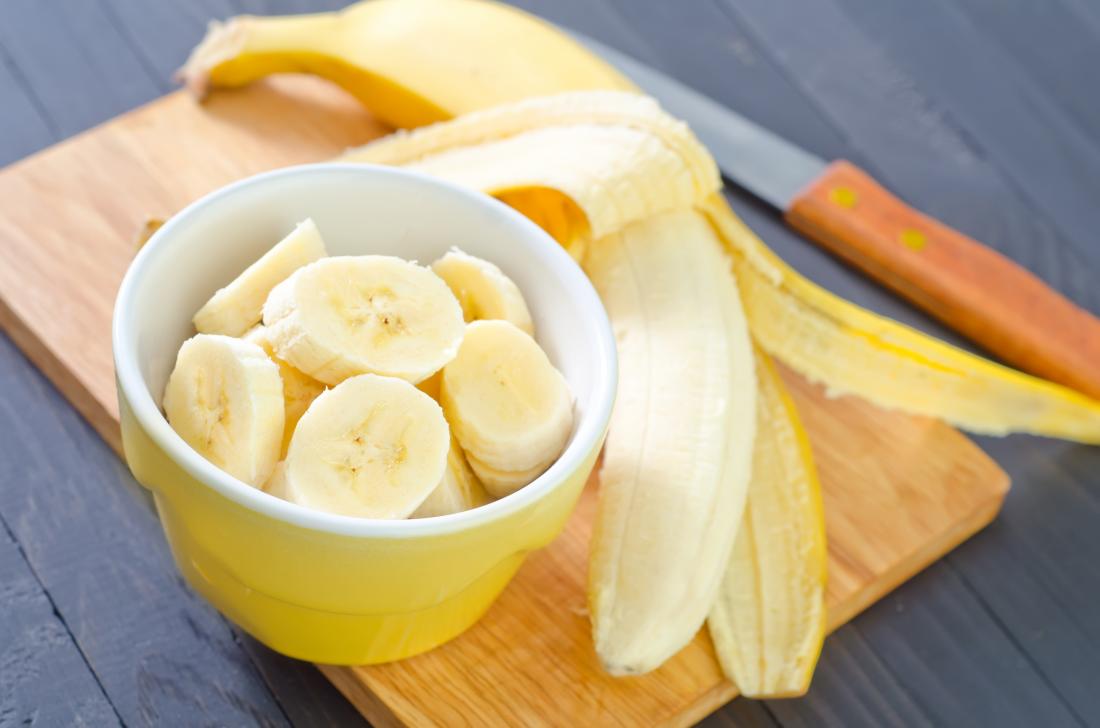Health Benefits of Bananas :- Bananas, scientifically known as Musa acuminate, are versatile, tasty, and healthy. The UN Food and Agriculture Organization lists over 1,000 kinds of this fruit as one among the most cultivated, traded, and consumed worldwide.1 Bananas are farmed in over 120 countries worldwide, originally from South and Southeast Asia-Australia.
Potassium and vitamin B6 are abundant in bananas. These nutrients and others in bananas can improve heart health and provide energy. Here’s why eating bananas can improve your health and how to cook them.
Health Benefits of Bananas

Increases Fiber Intake
- Fiber intake should be 22–34 grams (g) per day, depending on age and gender.3 Many Americans consume half this amount, unfortunately. Roughage, or fiber, is found in fruits, vegetables, and whole grains and supports digestive and heart health. It may also lower type 2 diabetes and colon cancer risk.
- Bananas help you get enough fiber. A medium-sized (7-inch) raw banana has 3 g fiber.5 Since bananas are soft and portable, they can be eaten by busy people, those with chewing issues, and young children, making them an easy source of dietary fiber.
Supports Heart Health
- Fruits include soluble fiber, which lowers LDL or ‘bad’ cholesterol, reducing heart disease and stroke risk. Soluble fiber prevents cholesterol absorption by attaching to cholesterol molecules in the small intestine.
- Bananas contain potassium, which helps control blood pressure, and fiber, according to the American Heart Association.7 A medium banana has 422 mg of potassium, 9% of the daily requirement.
- Potassium boosts sodium excretion. It also reduces blood pressure by relaxing blood vessel walls.7 This matters because extra salt in the bloodstream draws water into blood vessels, increasing blood flow and pressure. Hypertension is a serious heart disease risk.
Maintains Digestive Health and Easy to Digest
- Fiber is good for your gut health and can help you stay regular. There is soluble fiber and another kind of fiber called prebiotics in bananas. These two kinds of fiber are especially good for helping the good bugs in your gut grow. This keeps your digestive system healthy and helps your body work well overall.
- Additionally, bananas are an easy-to-digest food that is recommended as part of a bland diet for people who are having stomach problems like gas, diarrhea, or puking. People who have gastrointestinal conditions like GERD, traveler’s diarrhea, diverticulosis, or who are recovering from surgeries linked to the gastrointestinal tract may benefit from a bland diet.
Provides Energy
- In several ways, bananas boost energy. They provide carbs, the body’s main fuel. When unripe, bananas are mostly starch, but as they ripen, they become more sucrose. Simple carbohydrates quickly enter the bloodstream and provide energy.
- Bananas include vitamin B6, which helps with energy metabolism and mental health. Potassium-rich bananas are famous. Muscle and nerve function depend on potassium. Bananas also include fiber, which keeps you full.
- Easily portable, bananas provide energy when you need it. Bananas are a convenient option for pre-workout nourishment, morning snacks, and daytime energy.

Also See :- Health Benefits of Garbanzo Beans- Step By Step Guide
Promotes Muscle Function
- Electrolytes, such as potassium, are found naturally in bananas and are needed for muscles to work properly. Muscle weakness can be caused by not having enough potassium in the blood.
- Getting enough potassium is especially important for exercise because not getting enough can make muscles and the body as a whole tired and hurt your ability to do well in the exercise.
A Source of Antioxidants
- Bananas may not be the first food that comes to mind when you think of antioxidants, but they are found in them. There are antioxidants in a lot of foods, mostly plant-based foods like fruits and veggies.
- Antioxidants help the body’s immune system and shield cells from free radical damage caused by things like the sun’s ultraviolet rays, chemicals the body makes during metabolism, and toxins in the surroundings.
- Vitamin C, which is found in bananas, is a known antioxidant. In addition, they provide copper and manganese, which are known as antioxidant minerals because antioxidant enzymes need them to work.
Green Bananas Offer Resistant Starch
- Green bananas aren’t usually eaten due to their hardness and astringency, but demand for their flour and pulp is rising due to their possible health advantages. Green bananas are popular with researchers because they contain resistant starch.
- Starch that resists small intestine digestion is resistant. It feeds gut bacteria in the large intestine or colon by being fermented. Research shows that resistant starch, like fiber, improves gastrointestinal health, blood sugars, and inflammation.
:max_bytes(150000):strip_icc()/Bananas-02809456216b4984b8771f12be063cdf.jpg)
Also See :- 5 Food Groups That Are Easy to Digest- Step By Step Guide
Nutritional Facts of Bananas
Here is the nutrition facts for a medium-sized green banana, which is about 7 inches long and weighs 118 grams.
- Calories: 105 kcal
- Carbohydrates: 27 grams (g)
- Fiber: 3 g
- Manganese: 0.319 milligrams (mg) (14% of the DV)
- Copper: 0.092 mg (10% of the DV)
- Potassium: 422 mg (9% of the daily value or DV)
- Magnesium: 31.9 mg (8% of the DV)
- Riboflavin: 0.086 mg (7% of the DV)
- Vitamin B6: 0.433 mg (25% of the DV)
- Folate: 23.6 micrograms (mcg) (6% of the DV)
- Vitamin C: 10.3 mg (11% of the DV)
Bananas are rich in vitamin B6, which is involved in over 100 biochemical activities, including metabolism. Prenatal brain development and immunological function involve vitamin B6.
Manganese, which helps with energy, bone health, reproduction, blood coagulation, and immunity, is found in bananas.
Tips for Consuming Bananas
Some important nutrients can help you meet your needs when you eat bananas. Plus, they’re simple to add to a lot of different meals.
Bananas will ripen if you leave them out in the sun on a table at room temperature. You can put them in the fridge or freezer once they’re pretty much ready to eat. If a banana has gone bad, it will smell bad, leak juice, or have dark meat, so you should throw it away.
Here are some easy tips for consuming bananas:
- Add banana slices to your breakfast or cereal in the morning.
- For a tasty and healthy smoothie, blend fresh or frozen bananas with milk or water, other fruits or veggies, protein powder, or nut butter.
- Put mashed banana on toast, and then sprinkle cinnamon and chopped nuts or seeds on top.
- For a quick and healthy breakfast or lunch, mix them with protein-rich foods like Greek yogurt, milk, nuts, or nut butter.
- When making baked goods, use ripe bananas instead of extra sugar.
- You can freeze bananas that are about to go bad and then use them to make smoothies or frozen yogurt with bananas.
IF you like this Article Health Benefits of Bananas Please Share with Your Friends And Family Members.
